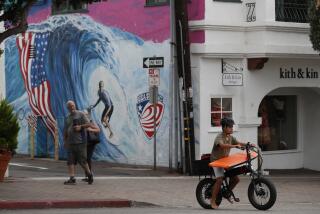New Chief Seeks Ban on Cruising in Oxnard
- Share via
Oxnard Police Chief Harold Hurtt announced Monday that he will seek to ban Sunday-night cruising on Saviers Road, saying the potential for violence is too high to allow it to continue.
Hurtt said the Police Department will release a report to the City Council in three weeks detailing problems at the popular cruising spot, from littering of businesses and residential neighborhoods to dangerous confrontations between gangs.
“The situation down there is almost at a critical point,” he said. “I think the only thing to do is to curtail the cruising.”
Hurtt’s announcement came one day after two young women suffered burns after an ex-boyfriend allegedly pulled up in a car on Saviers Road and sprayed caustic chemicals at them.
Mary Brennan, 17, of Ventura and Nanette DiStefano, 19, of Camarillo were treated for burns at St. John’s Regional Medical Center and released, police said. Brennan will be re-examined in a few days to determine the full extent of her injuries, according to police.
The type of chemical used in the attack has not been identified, but it caused Brennan to choke and suffer shortness of breath, investigators said. A police officer who examined the women’s car after the attack become dizzy and suffered headaches, officials said.
Police said they arrested Brennan’s ex-boyfriend, John Vicente, 19, of Oxnard on Monday on suspicion of assault with a caustic chemical. Brennan told police that Vicente had threatened her numerous times before Sunday’s attack.
The chemical attack only underscores the need for immediate action, Hurtt said.
“Most of the people down there are harmless,” he said. “But there are always a few that cause trouble and I don’t think the people of Oxnard have to put up with that kind of trouble.”
A ban on cruising would reverse the long-held policy of both the City Council and former Police Chief Robert Owens of tolerating the activity. The council decided in January, 1991, to allow cruising to continue although an Oxnard resident expressed fear that loitering youths would spark gang violence.
Hurtt said residents also have complained that the cruisers’ engines and loud stereos are a nuisance and that some youths use their lawns to urinate and drop trash.
“Either the business community or the neighbors or the city has to go and clean that up the next morning,” Hurtt said. “I don’t think the Oxnard taxpayers should have to stand for that.”
Business owners along the strip, which runs roughly from Pleasant Valley Road north to Iris Street, have complained that business drops off every Sunday night because customers are afraid of the cruisers, he said. Many of the 300 to 500 youths who cruise are gang members and there have been several incidents where violence among them was narrowly averted, Hurtt said.
Just two weeks ago, police investigated a report that a passenger in one car was flashing a gun at another car, Hurtt said. The weapon turned out to be an air rifle, but the occupants of the other vehicle didn’t know that, he said.
“If they had their own gun, they could have just shot at them,” he said.
The City Council has defended the weekly cruising in the past, saying it is well-regulated by police and proves an acceptable alternative to gangs. Some city leaders have argued that cruising has been a part of the city’s history since the early ‘60s.
But times are different, Hurtt said.
Reacting to Hurtt’s proposed new policy, one Oxnard City Council member expressed support for the crackdown.
Councilwoman Dorothy Maron, who once described cruising as a healthy outlet for teen-agers, said she no longer feels that way.
“I will be supportive of his report because I know it has gotten out of hand,” she said.
Hurtt declined to specify what measures he would recommend to discourage cruising, but said they would be similar to those he instituted in Phoenix, Ariz., where he was the second in command of the Police Department before taking the Oxnard job this month. The tactics included blockading streets and passing noise ordinances to prohibit the use of “boom box” car stereos.
More to Read
Sign up for Essential California
The most important California stories and recommendations in your inbox every morning.
You may occasionally receive promotional content from the Los Angeles Times.













